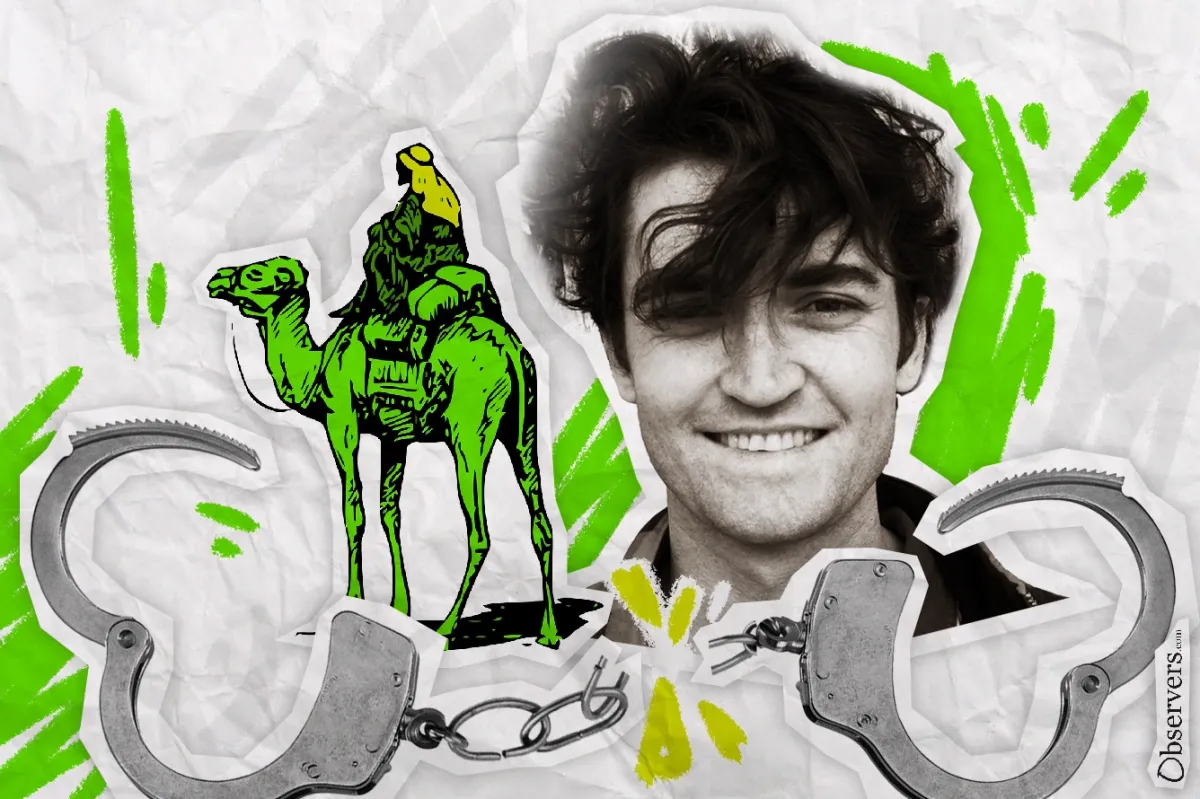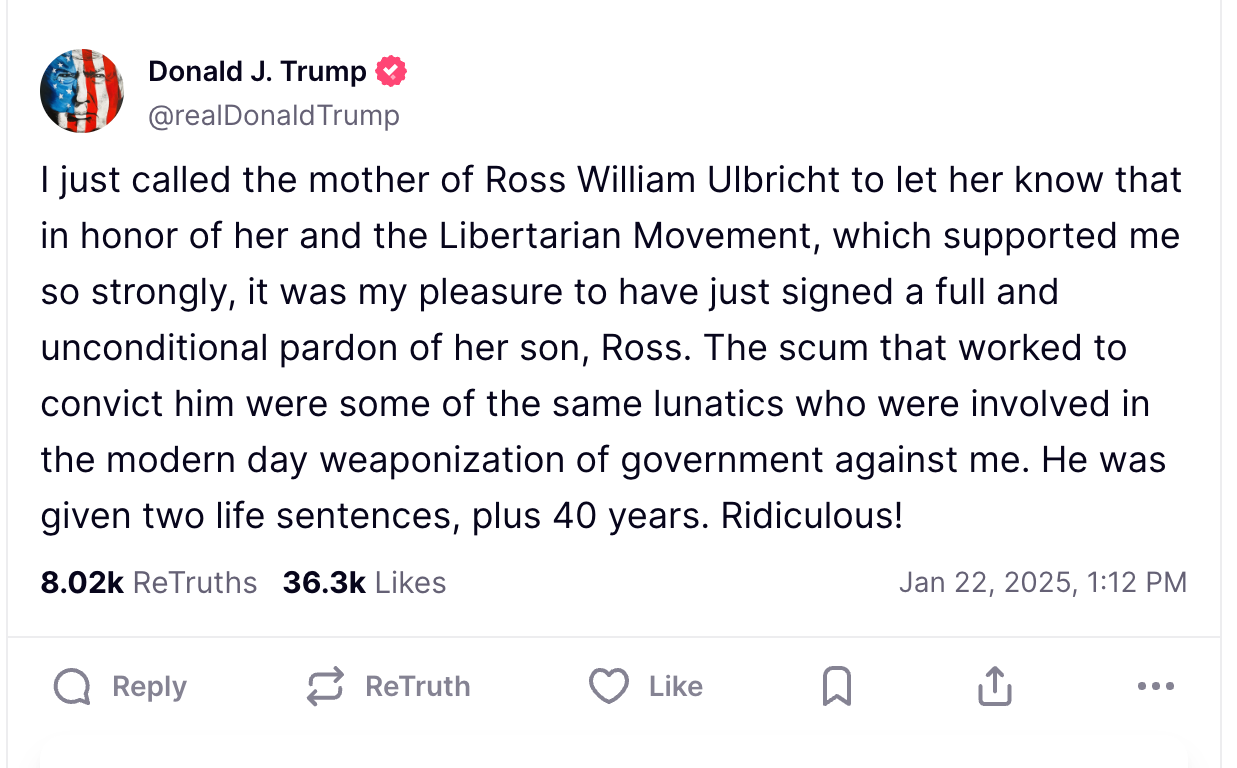
President Donald Trump has granted a “full and unconditional” pardon to Ross Ulbricht, the founder of Silk Road, the infamous online marketplace known for its underground drug sales and early use of Bitcoin. This move fulfills a promise Trump made during a speech at the Libertarian National Convention, where he cited the case as an example of government overreach.

In his post on Truth Social, he criticized the prosecutors involved in Ulbricht's case, referring to them as “scum” and part of the "modern-day weaponization of government."
Within the cryptocurrency community, Ulbricht is regarded as a trailblazer who pioneered Bitcoin's early adoption. Silk Road is credited with pushing the price of Bitcoin up to an early high of $266.00. In further evidence of the site's influence, the value plummeted to around $109.76 after news of the arrest leaked.
"Free Ross" campaigns have gathered steam over the years, marked by rallies, online petitions, and government lobbying.
Trump's re-election and courting of the crypto community gave him hope of clemency. A few days after Trump was elected president in November, Ulbricht thanked “everyone who voted for President Trump on my behalf” in a post on X.
Ulbricht, also known by his online pseudonym "Dread Pirate Roberts," was arrested in 2013 and charged with several offenses, including distribution of narcotics, trafficking, and money laundering. His platform, Silk Road, operated from 2011 until his arrest, utilizing Bitcoin for transactions to ensure anonymity and security for its users. The site enabled nearly 4,000 drug dealers to connect with over 100,000 buyers globally, facilitating more than $200 million in illegal transactions using Bitcoin.
Ulbricht was sentenced in 2015 to double life imprisonment plus 40 years without the possibility of parole. Following his conviction, he was required to forfeit nearly $184 million. To enforce this, the U.S. Marshal Service auctioned over 144,000 seized bitcoins in early 2014 when their value was around $334 each, totaling approximately $48 million. This is less than 0.5% of today's value of approximately $14 billion. The government also seized 69,370 Bitcoins from another wallet associated with Silk Road. It isn't clear if the government will hold onto such funds under Trump as part of his rumored "strategic reserve."
Critics of the prosecution contend that the life sentence was disproportionately severe given that Ulbricht was not directly involved in selling illegal products. they argue that the legal responsibility should be on the individual seller rather than the platform owner.
Others believe it wasn't about the drugs at all but rather a government agenda to shut down the first real use case of Bitcoin as a digital currency. From this point of view, Trump's pardon can be seen as an epoch change for the crypto community. As one user on X put it, "The same system that imprisoned Ross now embraces the technology he helped pioneer."
Ulbricht's case has also been controversial due to the nature of his platform. Silk Road was more than just a marketplace; it was a community where individuals could engage in transactions outside the scope of government surveillance. "I wanted to empower people to make choices in their lives and have privacy and anonymity," Ulbricht said at his sentencing hearing.
However, while Ulbricht envisioned the site as a free-market economic experiment aiming to demonstrate the possibility of a society devoid of coercive government interventions, the U.S. government viewed it as a massive criminal enterprise.
Silk Road listed over 10,000 products, predominantly drugs categorized under various labels like stimulants, psychedelics, and opioids. The platform also featured items like fake driver's licenses, although its terms of service banned the sale of goods intended to "harm or defraud," such as weapons, child pornography, and stolen credit cards. Still, some claimed such products were readily available on the site.
The Silk Road founder was also accused of commissioning multiple murders for hire, although these charges were not included in his trial. The allegations arose during investigations into Silk Road, where Ulbricht was claimed to have paid $730,000 for the assassination of individuals he believed were threatening the privacy of his operation.
This particular allegation significantly influenced public perception and was a key factor in the severity of Ulbricht’s sentencing for other crimes related to his operation of the Silk Road.
Following the announcement of the pardon, Ulbricht was released from a federal prison in Arizona. His lawyer, Joshua Dratel, stated that the pardon corrected a significant injustice, claiming that Ulbricht could now start anew and contribute positively to society.
Our immense gratitude to President Trump for giving Ross a second chance and to all those who have supported us throughout the years. From the bottom of our hearts, THANK YOU!!! – The Ulbricht family
So far, Trump has kept his promises to the crypto community. Now, the market eagerly awaits his next move.
